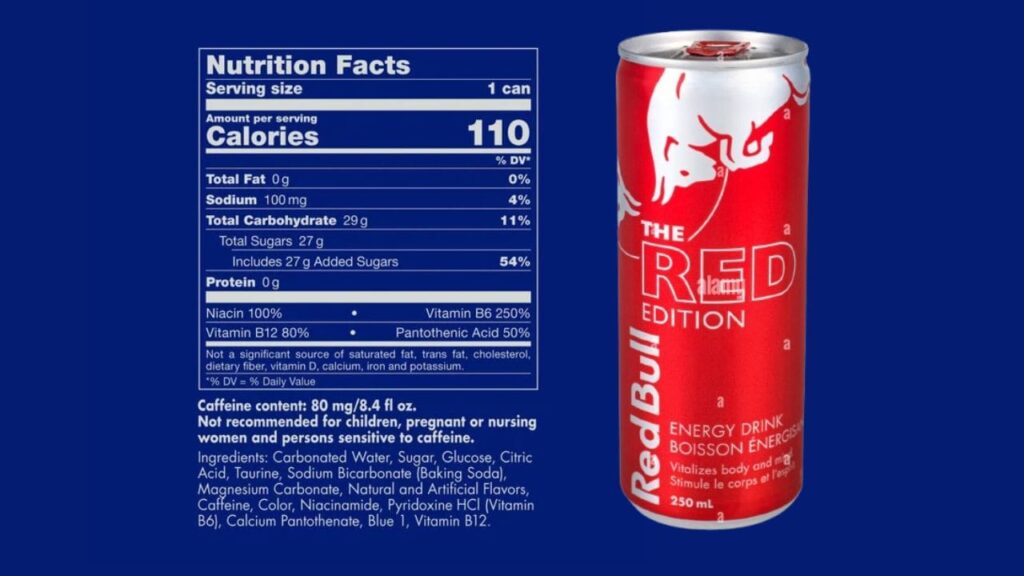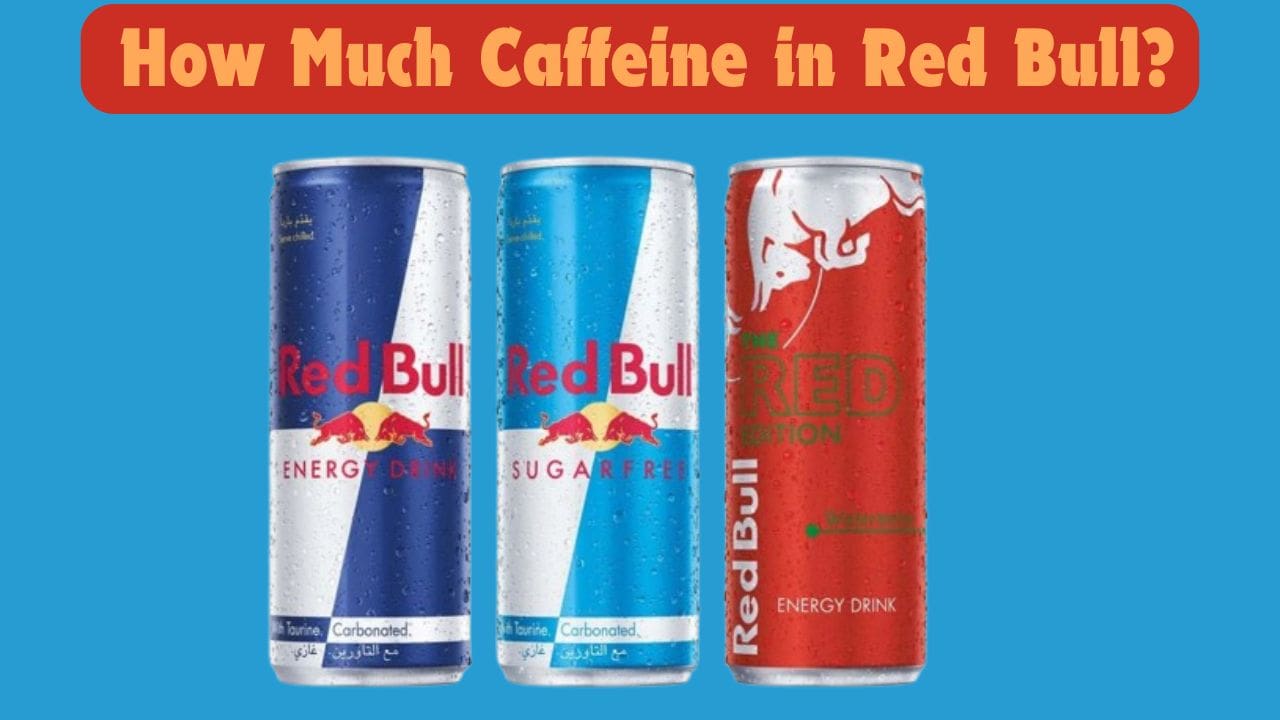Written By: Sherry Harris
Red Bull has become a household name, synonymous with energy and productivity. From students pulling all-nighters to athletes seeking a quick boost, this drink is everywhere. But one of the biggest questions surrounding Red Bull is: How Much Caffeine in Red Bull? Let’s dive into the specifics to help you make an informed choice.
Table of Contents
How Much Caffeine in Red Bull?
What Is Red Bull?
Red Bull originated in Austria in 1987 and quickly rose to fame as the world’s first mainstream energy drink. Known for its iconic slogan, “Red Bull gives you wings,” it’s formulated to boost energy levels and improve focus.
Red Bull contains caffeine, taurine, B vitamins, sugar (or artificial sweeteners in sugar-free versions), and carbonated water. Each ingredient plays a role in the drink’s energizing effects.
Does Red Bull Drink Have Caffeine?
Yes, Red Bull drink does contain caffeine. This popular energy drink is specifically designed to boost energy and alertness, with caffeine being one of its primary active ingredients. The amount of caffeine in Red Bull varies depending on the can size, but the standard 8.4-ounce can contains 80 mg of caffeine. This level of caffeine makes it comparable to a small cup of coffee, providing a moderate energy boost without being overly potent.
Caffeine plays a key role in enhancing focus and reducing fatigue, which is why it is included in energy drinks like Red Bull. It works by stimulating the central nervous system, helping you feel more awake and alert. For individuals who need a quick pick-me-up, Red Bull’s caffeine content is effective yet manageable when consumed responsibly.
Why Does Red Bull Contain Caffeine?
Caffeine is the star of most energy drinks, and Red Bull is no exception. It’s a natural stimulant known for improving alertness and reducing fatigue. The caffeine in Red Bull helps give you that much-needed jolt when energy levels dip.
Variants of Red Bull Drink
Original Red Bull
The Original Red Bull Energy Drink is the classic version that most people recognize. It comes in an 8.4-ounce can containing 80 mg of caffeine, making it ideal for those seeking a moderate energy boost. Its sweet and slightly tangy taste, combined with taurine and B vitamins, helps enhance both physical and mental performance.
Sugar-Free Red Bull
For those watching their sugar intake, Red Bull Sugar-Free offers the same energizing properties without the added calories. It has 80 mg of caffeine in a standard 8.4-ounce can, ensuring you get the same level of alertness and focus. Sweetened with artificial alternatives like aspartame, it is a popular choice for calorie-conscious consumers.
Red Bull Zero
Red Bull Zero is another sugar-free option that also features 80 mg of caffeine per 8.4-ounce can. Unlike Red Bull Sugar-Free, this variant is tailored for a smoother taste while maintaining the same energizing benefits. It appeals to those who want a sugar-free drink with a slightly different flavor profile.
Red Bull Editions
The Red Bull Editions line includes flavors like Tropical, Watermelon, and Blueberry. While the taste differs, the caffeine content remains consistent at 80 mg per 8.4-ounce can. These flavored versions are perfect for people who enjoy variety while still benefiting from the classic Red Bull formula.
Red Bull Shots
Red Bull Energy Shots are concentrated versions of the drink, available in smaller 2-ounce bottles. Despite their size, these shots pack a punch with 80 mg of caffeine, equivalent to the standard can. They are designed for quick consumption and are ideal for people who need an instant energy boost without the volume of a full drink.
Nutritional Facts of Red Bull Drink
The nutritional profile of Red Bull highlights its role as a quick energy booster. A standard 8.4-ounce can contains 80 mg of caffeine, 27 grams of sugar, and 110 calories, making it a moderate source of energy compared to other sugary drinks. It also includes key ingredients like B vitamins and taurine, which support energy metabolism and endurance. For those seeking sugar-free options, Red Bull offers alternatives with similar caffeine content but without added sugars or calories.
| Nutrient | Amount (8.4 oz) |
|---|---|
| Caffeine | 80 mg |
| Calories | 110 |
| Sugar | 27 g |
| Total Fat | 0 g |
| Sodium | 105 mg |
| Taurine | 1000 mg |
| B Vitamins (B3, B5, B6, B12) | Varies (10-20% of daily value) |
This balance of nutrients makes Red Bull a convenient choice for individuals looking for a quick energy boost, whether for work, exercise, or study sessions.

Key Ingredients of Red Bull Drink
The key ingredients of Red Bull drink are carefully chosen to provide a quick and effective energy boost. Here’s a detailed explanation of each ingredient:
- Caffeine: Red Bull contains 80 mg of caffeine per 8.4-ounce can. Caffeine is a natural stimulant that improves alertness, enhances focus, and helps reduce fatigue.
- Taurine: A vital amino acid included in Red Bull drink, taurine supports various body functions, such as regulating hydration, balancing electrolytes, and aiding muscle contraction.
- Sugars: The original Red Bull contains 27 grams of sugar, providing a rapid energy spike. This sugar content is responsible for the immediate burst of energy, though sugar-free options.
- B Vitamins: Red Bull includes essential B vitamins, such as B3 (niacin), B5 (pantothenic acid), B6, and B12. These vitamins play a crucial role in energy metabolism, converting food into usable energy for the body.
- Carbonated Water: The primary liquid base of Red Bull drink, carbonated water gives the beverage its fizz, making it refreshing and easy to consume.
- Citric Acid: Citric acid acts as a flavor enhancer and preservative in Red Bull, adding a tangy taste while helping to maintain the drink’s shelf life.
- Sodium Citrate: This ingredient regulates acidity and acts as a stabilizer, ensuring the drink’s flavor and texture remain consistent.
- Natural and Artificial Flavors: A mix of natural and artificial flavors is used to create Red Bull’s distinct taste, which is often described as fruity with a slight tang.
- Artificial Sweeteners: Sugar-free variants of Red Bull use artificial sweeteners like aspartame and acesulfame K, which provide sweetness without adding calories.
These ingredients work together to make Red Bull drink an effective energy booster, catering to those who need a quick pick-me-up for their busy lifestyles.
Alternatives to Red Bull Drink
If you’re looking for options beyond Red Bull, there are several energy drinks and beverages with comparable caffeine content and energizing benefits. Here are six popular alternatives:
Monster Energy
Monster Energy is a larger energy drink often consumed as a substitute for Red Bull. A 16-ounce can contains 160 mg of caffeine, double that of Red Bull’s standard size. It’s also available in a variety of flavors and sugar-free options, making it a versatile choice for energy enthusiasts.
Rockstar
Rockstar Energy Drink offers an intense caffeine punch with 160-300 mg of caffeine, depending on the flavor and size. It’s designed for those seeking long-lasting energy and comes in numerous variants, including zero-sugar and organic options. Rockstar caters to both casual drinkers and heavy-duty energy seekers. How Much Caffeine in Red Bull?
Bang Energy
For those who prefer an ultra-caffeinated option, Bang Energy delivers a whopping 300 mg of caffeine per 16-ounce can. It’s marketed for fitness enthusiasts and includes additional ingredients like BCAAs and CoQ10 for muscle recovery. However, its high caffeine content may not suit everyone.
5-Hour Shots
5-Hour Energy Shots are a compact yet powerful alternative, containing 200 mg of caffeine in a small 2-ounce bottle. These shots are ideal for quick, on-the-go energy and are sugar-free, making them a practical choice for busy professionals.
Celsius Drink
Celsius Energy Drink is another healthy alternative, featuring 200 mg of caffeine per 12-ounce can. It includes natural ingredients like green tea and ginger and is marketed as a fitness drink that boosts metabolism. Celsius is a go-to for people looking for clean energy with additional health benefits.
Coffee
For a more traditional caffeine fix, a cup of brewed coffee is a fantastic substitute. Depending on the size and brew strength, an 8-ounce cup typically contains 80-100 mg of caffeine, making it comparable to Red Bull. Coffee offers a more natural way to stay energized and can be tailored to your taste preferences.
| Alternative | Caffeine Content |
|---|---|
| Monster Energy | 160 mg (16 oz) |
| Rockstar Energy | 160-300 mg (varies) |
| Bang Energy | 300 mg (16 oz) |
| 5-Hour Energy Shot | 200 mg (2 oz) |
| Celsius Energy Drink | 200 mg (12 oz) |
| Brewed Coffee | 80-100 mg (8 oz) |
Whether you’re a fan of energy drinks or prefer natural alternatives, there are plenty of options to suit your needs while maintaining a similar caffeine profile to Red Bull.
Do You Know?
👉 Best Iced Coffee Drinks at Starbucks:
Impact of Red Bull Drink on Health
How Much Caffeine in Red Bull?
Energy Boost
One of the most immediate effects of Red Bull drink is the energy boost it provides, thanks to its caffeine and sugar content. The drink is designed to enhance alertness and reduce fatigue, making it a popular choice for students, athletes, and professionals. However, this boost is temporary and may lead to a crash if consumed in excess.
Effects on Heart
High consumption of Red Bull drink can affect heart health, particularly due to its caffeine and sugar levels. It may cause temporary increases in heart rate and blood pressure, which could be problematic for individuals with underlying heart conditions. Moderation is essential to minimize potential cardiovascular risks.
Impact on Sleep
Red Bull drink can disrupt sleep patterns, especially when consumed late in the day. The caffeine content may interfere with your ability to fall asleep or lead to reduced sleep quality. Avoiding Red Bull close to bedtime can help maintain a healthy sleep routine.
Physical Performance
Athletes and fitness enthusiasts often consume Red Bull drink to improve physical performance. The combination of caffeine, taurine, and B vitamins may enhance endurance and focus during workouts. However, excessive consumption may lead to dehydration, especially if paired with intense physical activity. How Much Caffeine in Red Bull?
Sugar-Related
The high sugar content in Red Bull drink can contribute to health issues like weight gain, tooth decay, and insulin spikes. Sugar-free versions offer a safer alternative for those concerned about calorie intake and long-term health risks associated with sugar.
Daily Intake of Red Bull Drink
The daily recommended intake of Red Bull drink depends on individual tolerance to caffeine and overall health. For most adults, limiting caffeine consumption to 400 mg per day is considered safe by health authorities. This means you could consume up to five 8.4-ounce cans of Red Bull in a day, but it’s better to stick to one or two to avoid side effects.
Consuming more than the recommended limit can lead to side effects like jitters, headaches, and even heart palpitations in sensitive individuals. It’s especially important for teenagers, pregnant women, and people with health conditions to avoid excessive consumption. Always listen to your body and prioritize moderation to enjoy the benefits without the drawbacks.
Conclusion
Red Bull drink is a widely recognized energy drink that provides a quick boost of caffeine-driven energy for various activities. Its combination of caffeine, taurine, and B vitamins makes it effective for improving focus and reducing fatigue. However, the drink’s sugar content and caffeine levels require responsible consumption to avoid adverse effects.
Moderation is key when incorporating Red Bull drink into your lifestyle. While it can enhance physical and mental performance, overconsumption may lead to negative health impacts. Whether you’re a casual consumer or a fan of energy drinks, staying within safe intake limits ensures you can enjoy the benefits without compromising your health.
Frequently Asked Question
Q. How much caffeine is in a can of Red Bull?
A standard 8.4-ounce can of Red Bull drink contains 80 mg of caffeine, which is roughly equivalent to a small cup of coffee. This amount is moderate compared to some other energy drinks but provides enough of a boost to enhance focus and energy levels.
Q. Is Red Bull bad for your health?
When consumed in moderation, Red Bull drink is generally safe for most healthy adults. However, excessive consumption can lead to side effects like jitteriness, increased heart rate, or disrupted sleep due to its caffeine and sugar content.
Q. Can you drink Red Bull every day?
Yes, you can drink Red Bull drink daily as long as you stay within the safe caffeine limit of 400 mg per day for adults. However, consuming it in excess or relying on it too frequently may lead to health concerns, including sugar-related issues or dependency on caffeine.
Q. What are the sugar-free options for Red Bull?
Red Bull Sugar-Free and Red Bull Zero are two popular sugar-free alternatives. Both contain the same 80 mg of caffeine as the original but are free of added sugar, making them ideal for calorie-conscious consumers.
Q. Can teenagers drink Red Bull?
Teenagers can consume Red Bull drink, but it’s important for them to limit their intake due to their lower tolerance for caffeine. Excessive consumption may cause sleep disturbances, increased heart rate, and dependence, so moderation is crucial for younger individuals.
How Much Caffeine in Red Bull?

